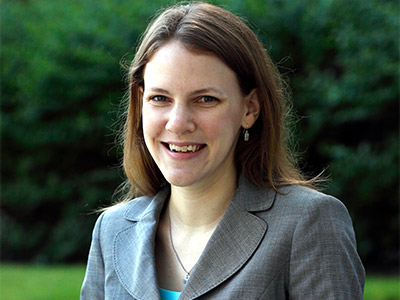Alum Susan Moudry Defends Dissertation in Church History
The Rev. Susan Mullin Moudry ’10, coordinator of clergy excellence for the Western PA Conference of The United Methodist Church, has lots of energy, loads of ability, and many interests. While a student at Pittsburgh Seminary she served as a Greek tutor, faculty research assistant, student chapel coordinator, and volunteer at the PTS-sponsored Zeitah Excavations in Israel. At graduation, her outstanding service and academic work were recognized with prizes for church music, homiletics and pastoral care, and church history studies.
Since receiving her M.Div. from PTS, Susan’s served on the Seminary’s Board of Directors, has been ordained in the UMC, and filled a dual appointment at two UMC churches in Western Pennsylvania. It was while fulfilling that first pastoral appointment that Susan discerned a call to a ministry of teaching, so she applied for doctoral studies in church history at Baylor University and soon received a full scholarship to enroll in the school’s Ph.D. program. Susan and her husband, Matt (who also attended PTS), moved to Waco, Texas, till Susan completed her doctoral coursework. This month she will be defending her dissertation—the final step in completing her doctoral work.
On the home front, Susan’s become the mother of Lizzie (born in Waco) and William (born after the family’s return to greater Pittsburgh). “Becoming a mother, writing my dissertation, and working for the Conference has definitely kept me busy,” Susan says. But she’s still made time, now and then, to share her thoughts about ministry and the Christian life on the Conference’s blog and through other social media. In one post, Susan wrote:
“For my doctoral work, I studied and wrote about Matthew Simpson. He came out of the Pittsburgh Conference, taught at Allegheny College, and was later elected a Bishop of the Methodist Episcopal Church. Simpson lived in turbulent times in the church and world, as the church dealt with slavery and war and division.
“In 1844, Simpson found himself part of the delegation at General Conference. United Methodist history buffs will know 1844 is the year the Plan of Separation was crafted and adopted by the MEC. In his personal reflections on the events he writes: ‘I object to a speaker being allowed to discuss the questions of dividing the church . . . .’ Then as he reflects on the Plan of Separation he says, ‘the measure was passed with comparatively little debate, but with different understanding on the part of the different delegates.’
“Complicated, personal, painful, misunderstood: all these words could describe the 1844 conference. I have to imagine the people there felt like there was more talk of walls than bridges, more lines in the sand than coming together. Yet we know the story does not end in 1844. The story changes, but it does not end.
“Maybe that hindsight, maybe that wisdom can inform something we’re doing today. Maybe the past offers us something of the perspective that God’s work is never done. Our gridlock is not the end. God is still moving. With that vision we can move forward as bridge builders rather than as a people who freeze up in the gridlock.”
Susan adds, “May it be so.”

